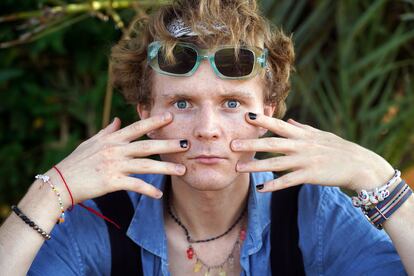The theater company that swapped Russia for Israel after the invasion of Ukraine
Members of the small and independent Fulcro theater group – who left Saint Petersburg because of the war – are trying out another scene in Israel

In December of 2021, when more and more voices warned of the imminence of an attack on Ukraine, the members of Fulcro – a small independent Russian theater company – wondered (half-jokingly and half-seriously) about where to emigrate in the face of the war they saw looming. “We already felt that there would be a big conflict, but we didn’t know if it [would be] with the Baltic countries, with Moldova or with Ukraine,” says Fulcro’s director, Dasha Shamina.
Laughter turned into suitcases two months later, when Russian troops invaded Ukraine and the theater company felt that it was no longer tied to Saint Petersburg. Shamina opted for Israel, knowing that she and more than half of the members would automatically receive citizenship, as they each have at least one Jewish grandparent. The director, two producers and seven actors quickly made the move, followed by some of the non-Jewish members of the troupe. Since October, all of them now live in the country. Fulcro now has a second opportunity, thanks to hundreds of thousands of Russian-speaking Israelis.
In the 1990s, more than a million citizens of the recently-collapsed USSR immigrated to Israel, bringing with them a taste for ballet, classical music and theater. From that wave – the largest population absorption in the country’s history – institutions such as the Gesher, the Russian-speaking theater in Jaffa, were born. Another theater in Tel Aviv – Habima – also has Russian roots, from prior to the creation of the Israeli state in 1948.

Today, the members of Fulcro perform with subtitles in Hebrew, to reach a wider audience. They’re preparing their first play in that language for September. On stage, they all receive the same applause… but when the curtain falls, their realities are different. Those with Jewish ancestry already have an identity document, while the rest survive waiting for the light at the end of a bureaucratic maze to receive permanent residence and a work permit.
Shamina – the director – defines the war in Ukraine as the straw that broke a camel’s back. “In Russia, we were a very independent company that never worked with the state. That’s why we were aware that our time there was limited. When the dictatorship became more present, starting in 2020, we understood that we would have to leave the country at some point. We’d been thinking about emigrating for years. For identity, for politics... for many reasons. But, in the end, we never did it, because we had the [theater] company,” she says, while sitting in a cafe in Jaffa.

The decision to leave was guided by two reasons. One, she points out, was ethical: “It was impossible to stay in the country that started an aggression against another. Before that, we didn’t have much hope [for change], but at least there was some. When the war began, that also ended.”
The second reason was related to security. Shamina, 33, admits that her family has an influential friend in the FSB – the Russian security service that is the heir to the KGB. She always felt this connection was a kind of armor that protected her theater group – it allowed them to criticize the country’s atmosphere or put together iconclastic montages that would have caused problems for other colleagues. “I don’t know if this was true or not, but at least it was the feeling I had – it made me feel protected. We talked openly about politics in nightclubs… on the other hand, we were careful not to spread any of this on social media.”

The outbreak of the war unleashed warmongering rhetoric and the persecution of dissent. The two houses of Russia’s State Duma approved punishing “disinformation” about Russia’s actions in Ukraine with up to 15 years in prison, penalizing anti-war protests and blocking its citizens’ access to various Western media outlets. Shamina felt that even her trump card was no longer a guarantee in the new context. “It was no longer safe to stay in the country,” she sums up.
The company – named after the fulcrum in a lever – did a couple of performances to say goodbye to its audience and announced that it would refund the money for a pending show. It was the end of Fulcro’s first life. The group was born in 2020, in the midst of the COVID-19 pandemic without state subsidies, out of gatherings between students from the theater school in Saint Petersburg.
In Fulcro’s second life, the acting troupe is presenting creations from both its Russian era and its new one. This summer, the group has combined its play titled The Chorus is Perishing – about World War I – with Die Blumen, a cabaret inspired by Bertolt Brecht, along with The Third Cabaret – Burning Bush, a piece about Holocaust survivors, with songs in six languages (Russian, German, Yiddish, Polish, Ukrainian and Hebrew).
This repertoire – as Fulcro’s producer Sonya Gromova says – has always addressed “the dangers of war” from the belief in the transformative potential of the performing arts. “So, when Ukraine happened, we felt a little ridiculous continuing [to perform] in Russia, since it was clear that we hadn’t managed to change anything,” she admits. The costumes and notebooks were brought by the members in suitcases. The large sets, meanwhile, are stored in a country house. Gromova, 22, explains that they’re trying to find a way to transport them from Russia.
February 24th
One of the actresses – Alya Goldman – began to imagine the new journey on February 24, 2022, when the invasion of Ukraine began. “The first thing [that my] husband and I did was to go on YouTube to watch Hebrew language [lessons],” she recalls. In the weeks that followed, they sold clothes and all their books in order to pay for the trip. “In Russia, some people from the artistic world demonstrated against the war. I chose to shut up and come to Israel. For me, the best way to say something is on stage.”
She was the second to land, in May of 2022, at the age of 24. “We didn’t know what would happen to us. We thought that we would just as well end up cleaning houses or spending the first night on the beach.” This was not the case. As she is Jewish, she receives help from the authorities and the City Council of Acre, the northern town where he lives. She and her husband were hired to sing at events in hotels. Goldman is also very happy, because she has just worked as an extra – for the first time – in the Tel Aviv opera, in Il trovatore, by Giuseppe Verdi.
Anton Varaksin – a year younger than Goldman – is the other side of the coin. As he isn’t Jewish, he still doesn’t have a residency card or a work permit. He arrived in October of 2022, one month after Putin ordered a partial mobilization of reservists to face the counter-offensive in Ukraine. “More than because of the [draft], I came because there were already a lot of people here who are my [colleagues],” he explains. “I know I need this theater. Now, it’s more important to me than ever before. And this is where it is based now.”

Varaksin is Ukrainian, from Donetsk. He’s known war since 2014, when he moved to Russia during the previous conflict with Ukraine. Today, he clarifies, his fear wasn’t to stay in Russia because he’s Ukrainian, but because he’s “an independent actor who has been following a creative path.”
“I wanted,” he summarizes, “to continue talking about what seemed important to me.”
Sign up for our weekly newsletter to get more English-language news coverage from EL PAÍS USA Edition
Tu suscripción se está usando en otro dispositivo
¿Quieres añadir otro usuario a tu suscripción?
Si continúas leyendo en este dispositivo, no se podrá leer en el otro.
FlechaTu suscripción se está usando en otro dispositivo y solo puedes acceder a EL PAÍS desde un dispositivo a la vez.
Si quieres compartir tu cuenta, cambia tu suscripción a la modalidad Premium, así podrás añadir otro usuario. Cada uno accederá con su propia cuenta de email, lo que os permitirá personalizar vuestra experiencia en EL PAÍS.
¿Tienes una suscripción de empresa? Accede aquí para contratar más cuentas.
En el caso de no saber quién está usando tu cuenta, te recomendamos cambiar tu contraseña aquí.
Si decides continuar compartiendo tu cuenta, este mensaje se mostrará en tu dispositivo y en el de la otra persona que está usando tu cuenta de forma indefinida, afectando a tu experiencia de lectura. Puedes consultar aquí los términos y condiciones de la suscripción digital.









































